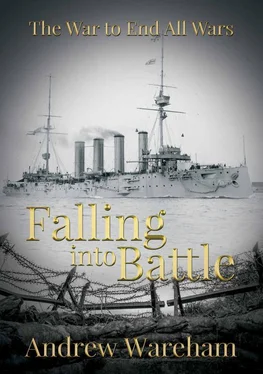“That’s bad luck, old chap. Still you’re here now. Not missing out on the fun. Don’t know any other Sturtons, except for the black sheep of the family, the uncle who ran off to the colonies twenty-odd years ago. Eloped, so they say. I suppose he might have come back with a son… Might be. I’ll ask the Pater when I next see him. Father’s the heir to Viscount Perceval. I’m next in line after him, but he’s got years in him yet, or so I hope. Quite like the old chap, in fact; wouldn’t want to see him dead even if it did give me the title that much sooner.”
There was a burst of fire from the most easterly of the barricades.
“Sounds like we are in business, Sturton. Sergeant, watch out for Germans trying to find a way round them.”
“Yes, sir.”
The outbreak died down, was followed by individual shots, presumably aimed fire. A minute and a machine gun began its chatter.
“While they’re firing that down the road, they can’t be sending solders in, sir. They’ll have to stop firing, unless they can get the thing up onto rooftops, maybe.”
“If they get up high then we shall be in trouble here, Sergeant.”
“We’ll need to pull back if they get a lodgement in the roofs, sir – but they’re steep and they won’t be easily climbed. No use their trying to fire from upstairs windows, because they face across the road and they’d have to hang out to aim, sir.”
“Add to that, if they try, we can set fire to the shops underneath them. Shouldn’t be impossible to arrange.”
“The Belgians might not like that, sir, burning their town down.”
Richard made a play of looking about him.
“Can’t see any Belgians hereabouts, Sergeant Grace.”
“’What the eye don’t see, the heart don’t grieve about’, my old Ma was used to say, sir.”
“Well put, Sergeant. More importantly – what they don’t see, they can’t blame us for. Must be them nasty invading Germans what did it, Mr Frog.”
“So it was, sir. For sure!”
“Only if necessary, Sergeant Grace. If I’m not here to give the order, I’m telling you now to do it.”
The machine gun stopped.
“Coming again, I reckon, sir.”
They listened to a whole company loosing rapid fire.
“Twenty aimed rounds a minute from each man, sir, down a narrowish street without much by way of cover. I wouldn’t want to be the battalion advancing into that, sir.”
The rifle fire ceased and after a few seconds, the machine gun fired again.
“They didn’t make it that time, sir.”
“They won’t until we run out of ammunition.”
Over the remaining hours of daylight parties of Germans appeared in each of the northward streets and were driven back by the rifles.
“Will they try in the dark, do you think, Sergeant?”
“Depends, sir. If they are top-notch well-trained infantry, they might. But, from what I hear, sir, the Germans make every man do service when he’s nineteen or twenty and then send them back to work again. Then they call them up when a war starts, give a week or two of reminder, you might say, and march them off to the front. You don’t train up marksmen that way – not like our army where the soldiers might have ten or twenty years behind them. Add to that, those men can obey orders, but they don’t know enough to be let out on their own. Six months from now, then I’d take them out at night, but not two or three weeks after they’ve been called up.”
“Makes sense, Sergeant Grace. Split the night into two watches, Abbott’s platoon till midnight; Ekins till four o’clock stand to. The platoon on duty to keep four sentries awake at any one time, rotating them an hour apiece, more or less. With luck, all of the men will get six hours of sleep. Be sure that you get some sleep, Sergeant.”
“Cooks will have to be awake earlier, sir. I’ll arrange that. I got two hours of kip this afternoon, sir.”
“Very good. Will you send a pair of men down the road south, first thing in the morning? Might make sense to know what’s behind us, how far to go to the next sensible stopping place when we have to pull back.”
“Will do, sir. One battalion ain’t holding a whole town for too long, sir. Going to be fight and retreat until we get a lot of support, sir. Be lucky to hold for three or four days, sir.”
Sturton listened silently, learning how to speak to a sergeant and how to sound like an officer. He would model himself on Baker, he decided – he sounded exactly what an officer should be.
Captain Smallwood came to the wardroom curtain, knocked on the bulkhead to announce his presence and beg permission to enter. He had a message flimsy in his hand.
“From onshore. Port Captain received it on his wireless. Delays the ship’s activities for twenty-four hours, and alters yours markedly, gentlemen.”
They were not surprised – orders changed frequently. Simon stood and offered his chair, there being no other space at their tiny table.
“Thank’ee, Mr Sturton. Aboukir’s senior lieutenant has gone sick, Mr Dacres. Carted off to the infirmary in Harwich, there to stay for a week or two, at least; heart problems, apparently, complicated by too much gin, from the little I saw of the man. Her captain and commander are both old and cannot take the extra burden between them, and her other lieutenants are variously ancient dugouts, failures dumped off better ships or reservists. Some of them have seniority, so you are going up to acting lieutenant-commander for the duration of your posting, which should be only a few weeks, with immediate effect. Report aboard Aboukir in Harwich ten minutes ago.”
“Aye aye, sir. Thank you for your confidence in me.”
Obviously the flotilla had been ordered to provide a body and Smallwood had chosen Dacres as the best for the demanding job. It was a compliment and the temporary promotion would show well on his record. He could reasonably hope to become lieutenant-in-command of an old destroyer rather than return to Sheldrake when his purgatory on Aboukir came to an end.
“No more than two months, according to the buzz, Dacres. The Live Bait Squadron is to be returned to reserve. The word is that they may be sent out to the colonies to act as guardships in undefended harbours, anchored up as floating batteries with small crews and a commander at most as captain. The Admiralty has noticed that they are useless at sea, thanks to loud protests from the brass at base.”
Dacres nodded thoughtfully.
“I worried for a moment that they might be left on station all winter, sir. They are good sea boats, if nothing else, and could remain at sea when the destroyers and light cruisers had to come in.”
“Hopefully not, Dacres. Good luck – not that you should need it – and I hope to see you next driving your own command.”
Two months in a massive and ancient and utterly valueless relic of Victorian thinking was not too high a price for accelerated promotion, Simon mused.
“Mr Sturton – smile, for your lucky day has come!”
“It has, sir?”
Simon knew he should be far too green in the rank to step up to premier even of the smallest destroyer – such things did not happen in a properly-regulated Navy. On the other hand, it was wartime and peculiar things seemed to be occurring rather frequently just of late.
“You are to be first lieutenant, vice Mr Dacres. Mr Parrett is to become sublieutenant. Mr Harker will take over direct control of all guns, Mr Parrett to understudy. We shall not be taking a new mid aboard because we haven’t got one spare at Harwich; one may turn up eventually. This is an early step for you, Mr Sturton, but Sheldrake is a small ship and you know her well and you have shown more than ordinary competence in the better part of a year you have been aboard. I have messaged the Commodore and he has agreed that you are one of the bright up-and-coming young men in destroyers and must be given your chance. A year and you may look to have your own boat – less than that if the new very small coastal craft actually appear.”
Читать дальше












